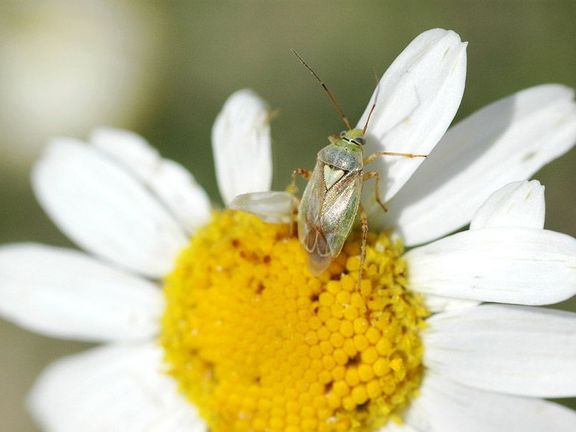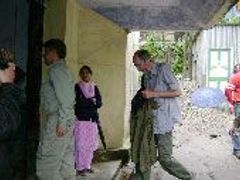
Darjeeling/Prague - Two Czech scientists who were arrested in India for what the local authorities called illegal bug collection are now awaiting charges before their trial begins. According to local laws, they could receive prison sentences of three to seven years.
Finally, after more than a month in prison, Petr Švácha and Emil Kučera were released on bail on July 25.
"Here anything can happen," the biologists replied to Aktuálně.cz´s question what sentence they expect. The general strike that has recently hit the Darjeeling region also complicates the whole situation.
Petr Švácha and Emil Kučera talked to Aktuálně.cz via email about their time in an Indian prison, difficulties with local lawyers and much more.
Read the 1st part of the interview: Czech scientists in India: We are not smuggling bugs
A.cz: How did the arrest take place?
We were arrested by four foresters in Goparma Hotel near Rimbick, which is not part of the [Singalila] National Park according to the information we have. They confiscated all the material we had collected as well as our equipment. Then they took us to Darjeeling and investigated us until early morning. They also gave us documents to sign, which were basically clean papers, saying these were meant to be used for the description of the confiscated material. We were stressed out, so unfortunately, we signed them. These documents can be used now against us.
A.cz: What happened then?
We slept on the floor of the police station and next day they continued investigating us. They took all of our cash and then they organized a conference at which they spoke of bug smuggling gangs and such nonsense. In the evening they took us to a court where the Judge refused to release us on bail. So they took us back to Darjeeling's jail where they kept us for a month.
A.cz: What conditions did you have in the prison?
The room where they kept us was about 25 meters long and the prisoners slept alongside the walls. They have only blankets. They gave us sleeping bags later on thanks to the Czech Embassy's intervention. There is nothing else in the room. There were roughly thirty men accused of all kinds of crime, including murder.
A.cz: How did the wardens and the convicts treat you?
Surprisingly, they treated us well. Unlike the foresters who arrested us, they tried to help us out and make it easier or us.
Indian lawyers
A.cz: The media reported that a certain lawyer wanted to help you but you asked for his replacement. What happened?
When they took us to the courtroom the next day, there was a lawyer already waiting for us and we do not know until now who really sent him. We authorized his representation because we had no other choice, even though we wanted a different lawyer. This one kept saying he is his colleague but later on we found out it was not true. We managed to get rid of him eventually but it was hard. We dare to say he was almost sabotaging the whole case. In the meantime, we found out there is not much difference among Darjeeling's lawyers. We prefere not to elaborate more on this issue.
A.cz: You were eventually released on bail. How much did you have to pay and who paid the bail for you?
It was 3,000 rupee for each of us, which means about CZK 1,200. It was the lawyers who paid for the bail. We have just received the bill from him, which included the bail fee.
A.cz: Having the experience with the Indian courts, what are your expectations now?
That is something we cannot really predict. Here anything can happen. Even if it was proved we were not in the National Park, we will probably end up at least paying a fine. We do not know yet which rule would be used in this case though, because the Wildlife Protection Act concerns only the protected territories.
A.cz: And what does your lawyer expect?
He says the same thing. Darjeeling's lawyers do not share the information with their clients as long as possible to be able to manipulate with them. All they care about is getting as much money as possible from the client. In the prison we met people who have been jailed for seven years and their trial is still pending.
World academics intervene
A.cz: Has the pressure prompted by the foreign scientists influenced the Indian authorities in any way?
We believe it has. The Darjeeling region strives for secession from the West Bengal using all kinds of means, such as the ongoing general strike. The motto of the day is: The worse the situation here is, the better for the region. We were used for their cause.
A.cz: Have you met anyone from the government or the scientists?
Not yet.
A.cz: Are you working on a project together and you went to India as friends or you work in different projects?
Švácha: We are not working on a project together. I am a professional biologist whereas Emil is an amateur - entomologist. Back home in the Czech Republic we meet from time to time, for example when we need to identify a larva.
A.cz: Have you travelled together before?
No, this is our first trip together.
Švácha: I needed to get a few larva species from the southern tip of the Himalayas Emil has been in India before, so I was happy he joined me. His knowledge of the local transport systems and accommodation was a great help to me.
To conclude let us thank Czech Foreign Ministry and Czech Embassy in India for their wonderful help. We thank also those who organized the petition and those who signed it or helped us in any other way.
